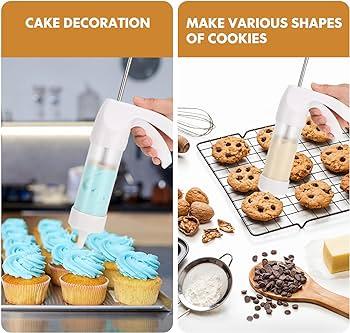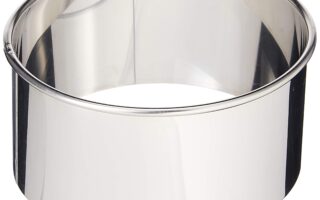In the world of baking, few tools are as versatile and delightful as the cookie press. Imagine transforming a simple ball of dough into an array of whimsical shapes and intricate designs, all with the press of a lever. While store-bought cookie presses provide convenience, crafting your own DIY cookie press opens the door to creativity, customization, and a sense of accomplishment. In this article, we’ll guide you through the exciting journey of making your very own cookie press, allowing you to personalize your baking experience and impress friends and family with beautifully crafted cookies. From the materials needed to step-by-step instructions, let’s dive into the art of DIY cookie pressing and discover how a few simple tools can elevate your baking to new heights.
Table of Contents
- Understanding the Benefits of Using a DIY Cookie Press
- Essential Materials for Crafting Your Own Cookie Press
- Techniques for Creating Beautiful Designs with Your Homemade Tool
- Enhancing Your Baking Experience: Tips for Using a DIY Cookie Press
- Q&A
- To Wrap It Up
Understanding the Benefits of Using a DIY Cookie Press
Creating beautiful and consistent cookies is a delightful experience, and a DIY cookie press enhances this process in several ways. First and foremost, it allows for an array of cookie shapes and designs, making your baked goods visually appealing. With a cookie press, you can effortlessly produce a uniform size and thickness, which ensures even baking. This method also encourages experimentation; you can try out different dough recipes and mix in ingredients such as chocolate chips, nuts, or sprinkles without losing the integrity of the design.
Moreover, a DIY cookie press is an eco-friendly option that promotes sustainability in your kitchen. By crafting your own press from everyday materials, you reduce the reliance on factory-produced plastic tools, contributing to less waste. The versatility of a homemade cookie press doesn’t stop at cookie creation; it can also be adapted for other baking tasks. Consider these advantages of a DIY cookie press:
| Benefits | Description |
|---|---|
| Cost-effective | Create your own press with minimal investment. |
| Customizable | Design shapes tailored to your preferences. |
| Learning experience | Enjoy a fun DIY project that enhances baking skills. |
Essential Materials for Crafting Your Own Cookie Press
Creating your own cookie press can be a delightful and rewarding endeavor, allowing you to add a personal touch to your baking experience. To get started, you will need a few essential materials that can be sourced easily. Begin with a sturdy plastic or metal tube, which will serve as the body of your cookie press. You’ll also require a plunger mechanism—this can be as simple as a wooden dowel or a more complex spring-loaded device, depending on your design preferences. Don’t forget to gather a selection of cookie disc templates; these can be made from cut-out plastic or thin metal sheets that can be interchangeable for different shapes and designs.
In addition to the main components, consider these accessory materials that can enhance your cookie press functionality:
- Silicone gaskets for a better seal
- Sandpaper for smoothing edges
- Food-safe paint or sealant to finish and protect your press
- Rubber bands for added grip on the tube
To help you visualize the necessary dimensions, here’s a concise table outlining key measurements for an effective cookie press design:
| Part | Recommended Size |
|---|---|
| Body Length | 6-8 inches |
| Tube Diameter | 2 inches |
| Plunger Height | 4-5 inches |
Techniques for Creating Beautiful Designs with Your Homemade Tool
Transform your baking experience by crafting intricate designs with your homemade cookie press. Start by experimenting with different cookie dough textures, as the consistency plays a crucial role in the design process. A softer dough may yield more intricate patterns, while a firmer dough can hold its shape better. To enhance the artistry, consider using food coloring to create vibrant layers or swirls in your cookie dough. Additives such as chocolate chips or sprinkles can also contribute to the overall visual appeal, providing contrast and texture that will make your cookies stand out.
Utilizing various stencil shapes will elevate your designs further. By creating a set of unique discs for your cookie press, you can produce a diverse range of patterns to suit any occasion. Here are some ideas to inspire your creativity:
- Seasonal Shapes: Leaves for autumn, hearts for Valentine’s Day, and snowflakes for winter.
- Floral Patterns: Roses or daisies for a spring-inspired treat.
- Geometric Designs: Circles, squares, or stars for a modern touch.
For a professional finish, consider using a color gradient technique. By using multiple colors of dough and layering them in your press, you can create cookies that are visually stunning. Pair your meticulously designed cookies with simple decorations, such as a light dusting of icing sugar, or a glossy glaze to add an extra layer of elegance.
Enhancing Your Baking Experience: Tips for Using a DIY Cookie Press
Using a DIY cookie press can dramatically elevate your baking game, offering an innovative way to unleash your creativity in the kitchen. To start, it’s essential to choose the right materials for your project. Consider using a sturdy plastic or metal tube for the press to ensure durability. A simple nozzle with various designs can provide flexibility, allowing you to create unique shapes and patterns. Here are some tips to optimize your DIY cookie press:
- Test the dough: Ensure your cookie dough is not too sticky or dry. A well-balanced dough will help cookies hold their shape.
- Keep it cool: Refrigerate your dough for a bit before filling your press. This makes it easier to extrude and achieves a perfect shape.
- Experiment with nozzle shapes: Different nozzles can produce distinct results; don’t hesitate to mix and match!
When using your homemade press, a little practice goes a long way. Start by loading a small amount of dough in your cookie press, ensuring it’s packed firmly but not overstuffed. Hold the press steady and apply even pressure to create uniform shapes. For a tidy workspace, consider using parchment paper as a base for your cookies. Here’s a handy table for commonly used dough consistencies:
| Type of Dough | Consistency | Best for Cookie Press? |
|---|---|---|
| Shortbread | Soft but holds shape | Yes |
| Sugar Cookie | Medium | Yes |
| Gingerbread | Firm | No |
Q&A
Q&A: DIY Cookie Press - Craft Your Own Confections!
Q1: What is a DIY cookie press?
A1: A DIY cookie press is a homemade tool used to shape cookie dough into various designs, allowing for creativity in cookie baking. Instead of purchasing a commercial cookie press, enthusiasts can craft their own from everyday materials, making baking not just a culinary activity, but also a fun DIY project.
Q2: Why should I consider making my own cookie press?
A2: Creating your own cookie press can be a fulfilling experience! It allows you to personalize the size, shape, and design according to your preferences. Plus, it can be more cost-effective than buying a store-bought model, and you may find that the assembly process adds an extra layer of creativity to your baking journey.
Q3: What materials do I need to make a DIY cookie press?
A3: You can use a variety of materials, but a common and simple approach involves using a clean squeeze bottle (like those used for condiments) or a sturdy tube with a plunger mechanism. For the decorative discs, you can repurpose items like plastic caps or thin pieces of cardboard shaped into your desired patterns. Just ensure that everything is food-safe!
Q4: Are there specific designs I can create with a DIY cookie press?
A4: Absolutely! The beauty of a DIY cookie press lies in the limitless possibilities. You can create cookies in shapes like stars, hearts, flowers, or even holiday-themed designs. If you have craft supplies, you can also make custom stencils. The simple act of squeezing dough through these unique shapes can turn ordinary cookies into delightful creations.
Q5: Is it difficult to operate a DIY cookie press?
A5: Not at all! Once your DIY cookie press is assembled, using it is quite straightforward. Fill it up with your chosen cookie dough, press the handle or squeeze the bottle, and watch as perfectly shaped cookies take form on your baking sheet. It may take a few tries to get the right consistency of dough and technique, but practice makes perfect!
Q6: What type of cookie dough works best in a DIY cookie press?
A6: The ideal dough for a DIY cookie press is a soft and smooth dough, often referred to as ‘spritz’ dough. This type of dough is typically richer in butter and sugar, with a lower flour-to-fat ratio, allowing for easy squeezing through the press without losing shape. Classic spritz recipes or other soft doughs are perfect candidates for your cookie-press adventures.
Q7: Can I clean my DIY cookie press easily?
A7: Cleaning your DIY cookie press depends on what materials you used. If you used a squeeze bottle, simply rinse it out with warm, soapy water after use. If your DIY press includes parts made from cardboard or non-waterproof materials, take care to clean them with a damp cloth without soaking them.
Q8: What are some ideas for the next steps after making my cookies?
A8: Once you’ve baked and cooled your cookies, you can go wild with decoration! Consider drizzling melted chocolate, applying colorful icing, or adding sprinkles. You could even host a cookie decorating party to share your delicious creations. After all, cookies are best enjoyed with friends and loved ones!
Q9: Where can I find inspiration for designs and recipes?
A9: The world of cookies is vast! Websites, baking blogs, and social media platforms like Pinterest and Instagram are excellent sources for inspiration. You can find countless designs and recipes suitable for a DIY cookie press, from classic favorites to contemporary twists. Don’t forget to explore cookbooks focused on baking and pastries too!
With these FAQs, you are ready to embark on your own DIY cookie press adventure — happy baking!
To Wrap It Up
As we wrap up our exploration of the DIY cookie press, it’s clear that this simple tool can unlock a world of creativity in the kitchen. Whether you’re a novice baker or a seasoned pastry chef, customizing your cookie press invites playful experimentation with textures, shapes, and flavors. From festive occasions to everyday treats, this hands-on project not only saves you money but also allows for a unique personal touch that store-bought tools can’t match. So gather your materials, unleash your imagination, and let each pressed cookie tell a story of your culinary journey. Happy baking!



